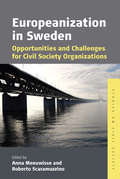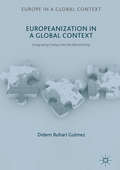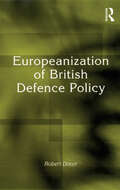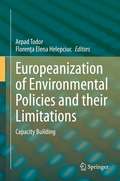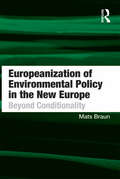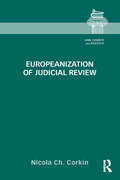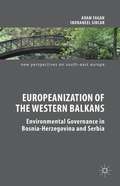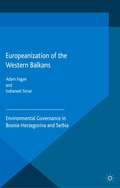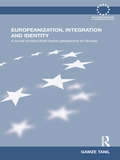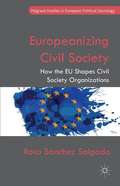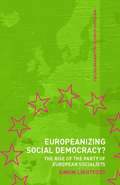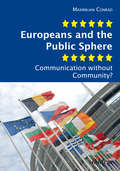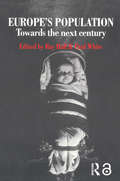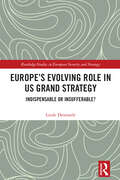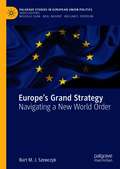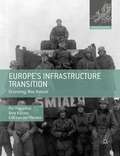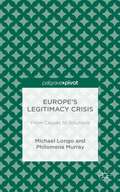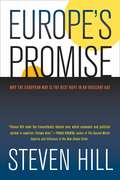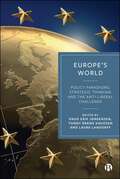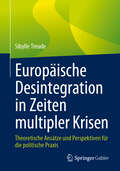- Table View
- List View
Europeanization in Sweden: Opportunities and Challenges for Civil Society Organizations (Studies on Civil Society #10)
by Anna Meeuwisse Roberto ScaramuzzinoNotwithstanding its many successes since 1945, the project of European integration currently faces major difficulties, from financial crises and mass immigration to the impending departure of the UK from the European Union. At the same time, these challenges have spurred civil society organizations within and across Europe, revealing a shared public sphere in which citizens can mobilize around refugee rights, opposition to austerity policies, and other issues. Europeanization in Sweden assembles new empirical research on how these processes have played out in one of the continent’s wealthiest nations, providing insights into whether, and how, the “Swedish model” can guide European integration.
Europeanization in a Global Context
by Didem Buhari GulmezThis book puts forward an original approach to Europeanization in a global context. Following the world polity approach, the author establishes the missing link between global, European and domestic realms and reveals the multiplicity of dynamics and logics driving the reform process in European Union candidate countries. A range of other topics are investigated, including whether Europeanization is only driven by parochial strategic interests or by broader normative concerns and how we can make sense of the selectivity in domestic compliance with the EU without succumbing to binary thinking. Focusing on the critical case of Turkey, the book puts forward three varieties of Europeanization: strategic, normative and ritualized, which underlie the complex dynamics that drive the reform processes in EU candidate countries. It will be of interest to scholars and students with an interest in Sociology, Political Science, International Relations, Globalization, Europeanization, European Studies and Turkish Studies.
Europeanization of British Defence Policy
by Robert DoverThe phenomenon of Europeanization has become a topic that is constantly under debate. This critical volume examines Europeanization through examples of British defence policy, the European Security and Defence Policy, the legal arms trade and the decision to go to war in Iraq in 2003. Drawing on examples from Austria and France, as well as unveiling the role of the Prime Minister and his close confidants in driving through this controversial defence policy, Robert Dover provides an original and engaging contemporaneous account of Europeanization. Academics, post-graduate researchers and analysts concerned with British foreign and defence policy and those interested in European defence policy more generally, will all find this study a must read.
Europeanization of Environmental Policies and their Limitations: Capacity Building
by Arpad Todor Florenţa Elena HelepciucThis book offers a window into the mechanisms that drive events when countries with poor track records in environmental protection and low administrative capacity, join an organisation with ambitious environmental regulatory regimes, which include some of the highest environmental protections standards in the world.This book examines the institutional building capacity in Romania after two decades of the development of the EU's environmental policy on elaboration, transposition, implementation, monitoring and institutional building. The book examines how Romania has fared as one of the least environmentally friendly EU member states, and poses the following questions. What are the limits of Europeanisation in the area of public policies? What is the reason why, despite the overwhelming public interest in environmental issues, and widespread agreement that urgent action to protect the environment and prevent catastrophic climate change are paramount, the pace of achieving the goals is remains slow. Why do policies fail?This book brings together several case studies focusing on the evolution of environmental policies in Romania over the last twenty years, with a special focus on the post-accession period (2007 onwards). The book provides an analysis of policies, where progress is less than satisfactory, and examines why this is the case.
Europeanization of Environmental Policy in the New Europe: Beyond Conditionality
by Mats BraunPrior to the European Union (EU) 2004/2007 enlargement there were several predictions that this event would hamper progressive decision-making within the EU on environmental policy. It was believed that the new member states had adopted EU rules as a consequence of the EU's conditionality and consequently they would rather slow down the reform speed in the field after accession. In this book, Mats Braun offers an up-to-date account of how post-communist member states have handled policy initiatives in the field of environmental policy after accession. Using detailed case studies of how Bulgaria, the Czech Republic, Poland and Romania dealt with two different EU policy initiatives - REACH and the Climate-Energy Package - he explores whether social norms and the process of socialization can help us understand why the track record of new member states in the area of environmental policy is more varied than was originally envisaged prior to enlargement.
Europeanization of Judicial Review (Law, Courts and Politics)
by Nicola Ch. CorkinEuropeanization of Judicial Review argues that the higher complexity of the political framework in which laws are made today leads to less well-designed laws and loop-holes, allowing politicians to leave decisions to the courts. The higher complexity of the political framework is a result of the need in the EU to consider both national and European legal and political rules when phrasing new laws. Both to decrease the complexity in the design of legislation and to preserve the ideal of the rule of law, the courts now are more likely to rule laws unconstitutional. The book employs a wide range of quantitative and qualitative methods to collect new data about the German, Austrian, and Italian constitutional courts over the last four decades. These three courts have a comparable history, theoretical background, and structure while differing in two key components: length of EU membership and legitimacy perception. Corkin employs multi-method research based on over fifty interviews with judges, politicians and civil servants; content analysis of abstract judicial review cases over three decades; and a database of over 300 variables relating to the courts and their surroundings. Her data reveals that in abstract judicial review, and in the wider political arena, political culture has become more confrontational due to attitude changes in politicians and judges. These attitude changes can be directly linked to the EU and have wide-ranging implications for legitimacy, democracy and political methodology. Presenting a bridge between the revitalized realist and legalist debate, Europeanization of Judicial Review will contribute to socio-legal theory, literature on comparative courts, and both new institutionalism and Europeanization theory.
Europeanization of National Security Identity: The EU and the changing security identities of the Nordic states (Contemporary Security Studies)
by Pernille RiekerThis new book tackles two key questions: 1) How is the EU functioning as a security actor? 2) How and to what extent is the EU affecting national security identities? Focusing on the four largest Nordic states (Denmark, Finland, Norway and Sweden), this incisive study analyzes how and to what extent the EU affects national security identities. It shows how the EU has developed into a special kind of security actor that, due to its level of political integration, has an important influence on national security approaches and identities. This new analysis applies a fresh combination of integration theory, security studies and studies of Europeanization. The main argument in this book is that, rather than adapting to the changing conditions created by the end of the Cold War, the Nordic states changed their security approaches in response to the European integration process. It shows how different phases in the post Cold War European integration process have influenced the national security approaches of Sweden, Finland, Denmark and Norway. While all four security approaches seem to have been Europeanized, the speed and the character of these changes seem to vary due to a combination of differing ties to the EU and differing security policy traditions. This new book will be of great interest to all students of European Defence, national security and of security studies in general.
Europeanization of the Western Balkans: Environmental Governance in Bosnia-Herzegovina and Serbia (New Perspectives on South-East Europe)
by Adam Fagan Indraneel SircarEuropeanization of the Western Balkans.
Europeanization of the Western Balkans: Environmental Governance in Bosnia-Herzegovina and Serbia (New Perspectives on South-East Europe)
by Adam Fagan Indraneel SircarThe book analyses the changing roles of international agencies, governmental bodies, non-governmental organisations, and local communities around major road-building environmental impact assessment processes in order to examine whether the influence of the European Union has transformed environmental governance in Bosnia-Herzegovina and in Serbia.
Europeanization, Care and Gender
by Anne Kovalainen Hanne Marlene Dahl Marja KeränenThiscollection addresses the complexity of care arrangements in contemporaryEurope, developingnew insights into debates about the care crisis, gender equality, the division of work and the reconciliation of care and work. "
Europeanization, Integration and Identity: A Social Constructivist Fusion Perspective on Norway (Routledge Advances in European Politics)
by Gamze TanilThis book analyses how domestic and European structures impact on national actors’ identities, interests and foreign policy practices. Employing Norway as the case study area, the author uses this nation as an example to assess Europeanization and identity politics across the European Union (EU). Utilising an original and innovative approach called ‘social constructivist fusion perspective’, the author addresses Europeanization across several key factors. The author assesses the influence of the EU on ‘half-way member countries’, and the impact of identity politics and domestic structures, which factors contribute to or hinder Europeanization, and attempts to empirically measure Europeanization at the actor level. It analyses the impact of domestic and European structures on the identities, interests, attitudes and foreign policy practices of the Norwegian policy-makers. Whilst contributing to knowledge and literature on how constructivist approaches can be utilized in empirical studies of political elites, this book goes beyond theory to demonstrate that Europeanization is not only institutional, and provides evidence of the influence of identity politics. Europeanization, Integration and Identity will be or interest to students, scholars and policy-makers in the field of European Union politics, international relations, social constructivism and Scandinavian politics.
Europeanizing Civil Society
by Rosa Sanchez SalgadoThe European Union clearly matters for Civil Society Organizations (CSOs). EU officials and European political entrepreneurs has been crucial in the promotion of funding and access opportunities, but they have been proven to have little capacity to use CSOs for their own purposes.
Europeanizing Greece
by Nancy VamvakasWhile Greece's debt crisis continues to dominate international headlines, the country has received remarkably little scholarly attention - especially in comparison to other European Union members. Europeanizing Greece explores the developments that resulted from Greece's European integration between 1989 and 1999, which played a crucial role in shaping the country's current conditions.Focusing on changes made to the Greek administrative and political system based on EU structural policy, Nancy Vamvakas contends that EU involvement was not the only reason why these modifications were implemented. Vamvakas points out serious flaws in the Greek system and demonstrates how Greece's approach to reform has been inextricably linked to the perceived level of crises. Europeanizing Greece serves as a perceptive case study of the EU's continual enlargement and resulting regional challenges.
Europeanizing Social Democracy?: The Rise of the Party of European Socialists (Routledge Advances in European Politics #Vol. 31)
by Simon LightfootPresenting a detailed explanation of party politics in the European Union, this new book uses the Party of European Socialists (PES) as a key case study, and tests the relevance of existing theoretical work on the meaning, significance, and prospects for realising other ‘Europarties’. This analysis operates from the assumption that the PES’s main goal is to influence the outcome of EU public policy, rather than the more traditional party goals of vote maximisation or office seeking. Secondly, by subjecting the PES to careful scrutiny in two specific policy areas (employment and environment) and for specific treaties (in particular the Treaty of Amsterdam), it tests the PES’s ability to construct policy to influence actual policy outcomes. Finally, it shows that whilst the PES was able to play a role in co-ordinating policy amongst the member parties since its formation in 1992, its influence has been exaggerated and the strength of the factors that limit its effectiveness have been underestimated. It argues that domestic policy imperatives and ideological differences between the member parties have hindered the development of the PES, thereby advancing our knowledge of Europarties and contributing to the literature on the Europeanization of political parties. This book will be of great interest to students and scholars of the European Union and party politics in general.
Europeans and the Public Sphere: Communication Without Community?
by Maximilian ConradWhat kind of public sphere is possible in the European Union with its considerable diversity of national identities, languages, and media systems? Against the backdrop of debates about a fundamental European community deficit and the possibility of postnational democracy, this book explores the role of a European public sphere not only in bridging presumed gaps between citizens and their representatives in the European institutions but also in creating transnational communicative spaces that contribute to the politicization of EU politics.Drawing on Deweyan pragmatism, social constructivism, and the Habermasian notion of constitutional patriotism, this book moves beyond the conventional wisdom that a European public sphere necessitates the existence of a sense of European 'identity light'. Arguing that a political sense of community along the lines of a European constitutional patriotism can only emerge out of the democratic process itself, Maximilian Conrad looks at the role of daily newspapers not only as framers of public debate, but also as actors with distinct normative views regarding the future of the integration process, both in terms of the nature of the EU as a polity and the nature of democratic rule in this polity. The crucial empirical question addressed in the book is: Do newspapers with a pronounced preference for more democracy beyond the nation state also play a more active role in providing forums for transnational debate?
Europes Population: Towards The Next Century
by Paul White Ray HallFirst published in 1995. Routledge is an imprint of Taylor & Francis, an informa company.
Europe’s Eastern Crisis
by Richard YoungsIn recent years a series of crises have erupted on the European Union's eastern borders. Russia's annexation of Crimea and the subsequent conflict in eastern Ukraine presented the EU with a major foreign policy challenge, in both Ukraine and across the other countries of the so-called Eastern Partnership. In response, the EU has begun to map its own form of 'liberal-redux geopolitics' that combines various strategic logics. This book traces the effect of these crises on the foreign policy of the EU, examining the changes in policies towards the countries on its eastern borders, the EU's review of the Eastern Partnership, as well as the EU's relations with Russia overall. It goes on to uncover whether the EU has contained the crisis or if it has set up new conditions for more instability in the future.
Europe’s Evolving Role in US Grand Strategy: Indispensable or Insufferable? (Routledge Studies in European Security and Strategy)
by Linde DesmaeleThis book looks at the evolution of the role of Europe in US grand strategy, and unpacks how US administrations have instrumentalized this relationship in pursuit of extra-European objectives. The work considers geopolitical pressures in conjunction with leaders’ strategic ideas to provide an account of the evolution of the role of Europe in the context of US grand strategy. Observers generally agree on the vague notion that Europe has been de-prioritized in Washington’s external affairs. Against this background, the book makes the case that such de-prioritization of Europe in the context of US grand strategy also entails a reconceptualization of the transatlantic relationship, namely as a region featuring long-standing relationships that can at times be leveraged in pursuit of non-European goals. The United States has a long history of seeking European support or acquiescence for its role as the leader of the international system, but whereas during the Cold War Washington enlisted its European allies in a grand strategic struggle against a European power, more recently, it has sought to enlist European allies in extra-European struggles of different types. Thinking about the role of Europe in US grand strategy now requires new theoretical and empirical tools that allow for the recognition of this very fact. Accordingly, this book proposes that strategic ideas on the viability of international cooperation held within the White House crucially shape what – if any -- type of support the United States seeks from Europe on the global stage. In doing so, the book adds important nuance to other accounts proclaiming either the proverbial death of the transatlantic relationship or the eternal and unchanging nature thereof. This book will be of much interest to students of European security, US foreign policy, and International Relations.
Europe’s Grand Strategy: Navigating a New World Order (Palgrave Studies in European Union Politics)
by Bart M. SzewczykThis book proposes that the European Union should craft a grand strategy to navigate the new world order based on a four-pronged approach. First, European decision-makers (both in Brussels and across EU capitals) should take a broader view of their existential interests at stake and devote greater time and resources to serving them within the wider cause of the liberal order. Second, Europe needs to help reinvigorate the West by restoring a sense of solidarity through fairer distribution of benefits and burdens. Third, it should develop separate strategies for parts of the world, such as Russia and China, where liberal values are not likely to be attainable in the foreseeable future yet order is still necessary. Fourth, Europe needs to clarify its core interests elsewhere and help stabilize the Middle East and Africa. With this book, the author seeks to lay the essential building blocks for developing a European strategy, which is a complex process involving multiple decision-makers and institutions.
Europe’s Infrastructure Transition: Economy, War, Nature (Making Europe)
by Per Högselius Arne Kaijser Erik Van Der VleutenEurope’s Infrastructure Transition.
Europe’s Legitimacy Crisis: From Causes to Solutions
by Michael Longo Philomena MurraySharp in focus and succinct in analysis, this Pivot examines the latest developments and scholarly debates surrounding the sources of the European Union's crisis of legitimacy and possible solutions. It examines not only the financial and economic dimensions of the current crisis, but also those crises at the heart of the EU integration project.
Europe’s Migrant Policies
by Suzanne MulcahyEurope is becoming increasingly anxious about issues of immigration and immigrant integration. Bans on the construction of minarets in Switzerland, prohibition of the wearing of face-covering veils in Belgium and crackdowns on Roma migrants in France and Italy are all signs of the growing prominence of the issue. Apart from these headline-grabbing policies, many European countries have also been imposing civic integration policies on migrants and restricting their rights to participate in public life. What is driving such policies at the national level? And where does the EU fit into this picture? This book provides a comparative analysis of the impact of the EU, if any, on the policies and politics of immigrant integration in its member states. It investigates whether the EU can be a force for good in a policy area until now thought to be at the discretion of member states.
Europe’s Promise
by Steven HillA quiet revolution has been occurring in post-World War II Europe. A world power has emerged across the Atlantic that is recrafting the rules for how a modern society should provide economic security, environmental sustainability, and global stability. In Europe's Promise, Steven Hill explains Europe's bold new vision. For a decade Hill traveled widely to understand this uniquely European way of life. He shatters myths and shows how Europe's leadership manifests in five major areas: economic strength, with Europe now the world's wealthiest trading bloc, nearly as large as the U.S. and China combined; the best health care and other workfare supports for families and individuals; widespread use of renewable energy technologies and conservation; the world's most advanced democracies; and regional networks of trade, foreign aid, and investment that link one-third of the world to the European Union. Europe's Promise masterfully conveys how Europe has taken the lead in this make-or-break century challenged by a worldwide economic crisis and global warming.
Europe’s World: Policy Paradigms, Strategic Thinking and the Anti-Liberal Challenge
by Knud Erik Jørgensen, Tonny Brems Knudsen and Laura LandorffThe EU’s international environment is increasingly characterized by power politics, great-power rivalry, ideological contestation and war. This has challenged the liberal-internationalist identity that has been at the heart of the EU since its birth. This book examines how the EU has responded to these new realities. It analyses the introduction of a flurry of concepts including European sovereignty, strategic autonomy, civilization, responsibility and strategic compass, and asks whether these signal a reconsideration of foreign policy objectives, a new strategic orientation or possibly a paradigm shift. The book develops a theoretical framework on policy paradigms, worldviews, grand strategy, strategic narratives and the drivers of institutional change followed by chapters on the anti-liberal challenge, the evolution of the EU framework of ideas, the search for grand strategy and strategic autonomy, the response to Russian aggression and imperial thinking, and continuity and change in EU unity, working groups, green leadership and strategic communication.
Europäische Desintegration in Zeiten multipler Krisen: Theoretische Ansätze und Perspektiven für die politische Praxis
by Sibylle TreudeDie Nachkriegsgeschichte ist geprägt vom Gedanken des stetigen Zusammenwachsens Europas. Schon die ökonomischen Krisen der vergangenen Jahre ließen jedoch verstärkt Zweifel an dieser Linearität aufkommen, die spätestens durch den Brexit enorm verstärkt werden. Dieses wissenschaftliche Textbuch gibt einen Einblick in den interdisziplinären Diskurs und das mittlerweile vielseitige Angebot an (des-)integrationstheoretischen Ansätzen zur Beschreibung, Erklärung und Prognose von Krisen und von der Desintegration Europas. Im Zentrum der Betrachtung stehen sowohl drei als etabliert geltende Forschungsrichtungen als auch drei jüngere Ansätze, die bis dahin noch nicht fokussierte Fragen, Aspekte und Ursache-Wirkungszusammenhänge aufzeigen und neue Modellierungen europäischer (Des-)Integrationsphänomene und -entwicklungen ermöglichen.Das Buch richtet sich an in dem Themengebiet fortgeschrittene Studierende, Wissenschaftler, Politiker im EU-Kontext, in der Politikberatung Tätige sowie alle, die an der politischen und wirtschaftlichen EU-Integration interessiert sind.
